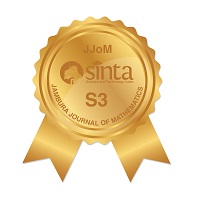Efektifitas Vaksinasi dan Pengasapan pada Model Epidemik Transmisi Penyakit Malaria
Abstract
Keywords
Full Text:
PDF (Bahasa Indonesia)References
Agusto, F.B., Marcus, N. & Okosun, K.O., 2012, Application of optimal control to the epidemiology of malaria, Electronic Journal of Differential Equation, Vol. 2012(2012), No.81, pp. 1-22
Bloland, P.B. & Williams, H.A., 2002, Malaria Control During Mass Population Movements and Natural Disasters, Washington, The National Academies Press
Chitnis, N., Chussing, J.M. & Hyman, J.M., 2006, Bifurcation Analysis of A Mathematical Model for Malaria Transmission, Siam J. Appl. Math. Vol. 67, No. 1, pp. 24-45
Diekmann, O., Heesterbeek, J.A.P. & Metz, J.A.J., 1990, On the Definition and the Computation of the Basic Reproduction Ratio â„›0 in Models for Infectious Diseases in Heterogeneous Populations, J. Math. Biol., 28, pp. 365-382
Johansson, P. & Leander, J., 2010, Mathematical Modeling of Malaria: Methods for Simulation of Epidemics, Gothenburg: Chalmers University of Technology
Laarabi, H., Labriji, E.H., Rachik, M. & Kaddar, A., 2012, Optimal Control of an Epidemic Model with A Saturated Incidence Rate, Modelling and Control. Vol.17, No.4,448-459
Labadin, C., Kon, M.L. & Juan, S.F.S., 2009, Deterministic Malaria Transmission Model with Acquired Immunity, Proceedings of the World Congress on Engineering and Computer Science 2009 Vol II, San Francisco, USA
Putri, R.G., Jaharuddin & Bakhtiar, T., 2014, SIRS-SI Model of Malaria Disease with Application of Vaccines, Anti-Malarial Drugs, and Spraying, IOSR Journal of Mathematics (IOSR-JM), Vol.10, Issue V Ver. II
Resmawan, Sianturi P. & Nugrahani E.H., 2017, The Analysis of SEIRS-SEI Epidemic Models on Malaria with Regard to Human Recovery Rate, Aceh Int.J.Sci.Technol (AIJST), 6(3), pp.132-140
Resmawan & Nurwan, 2017, Konstruksi Bilangan Reproduksi pada Model Epidemik SEIRS-SEI Penyebaran Malaria dengan Vaksinasi dan Pengobatan, Jurnal Matematika Integratif (JMI), Vol.13, Nomor 2 pp.105-114
Schwartz, L., Brown, G.V., Genton, B. & Moorthy, V.S., 2012, A Reiew of Malaria Vaccine Clinical Projects Based on the WHO Rainbow Table. Malaria Journal. 11:11
Van den Driessche, P. & Watmough, J., 2002, Reproduction numbers and subthreshold endemic equilibria for compartmental models of disease transmission, Mathematical Biosciences, 180(1-2): 29-48
DOI: https://doi.org/10.34312/jjom.v1i1.2004
Copyright (c) 2019 Jambura Journal of Mathematics
Jambura Journal of Mathematics has been indexed by
Jambura Journal of Mathematics (e-ISSN: 2656-1344) by Department of Mathematics Universitas Negeri Gorontalo is licensed under a Creative Commons Attribution-NonCommercial 4.0 International License. Powered by Public Knowledge Project OJS.
Editorial Office
Department of Mathematics, Faculty of Mathematics and Natural Science, Universitas Negeri Gorontalo
Jl. Prof. Dr. Ing. B. J. Habibie, Moutong, Tilongkabila, Kabupaten Bone Bolango, Gorontalo, Indonesia
Email: [email protected].



















